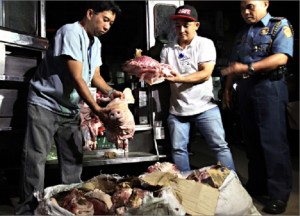‘Hot meat’ law gets tougher

President Aquino has signed a law criminalizing the sale of “hot meat,” a potential source of disease for unsuspecting consumers. FILE PHOTO
MANILA, Philippines—President Aquino has signed a law criminalizing the sale of “hot meat,” a potential source of disease for unsuspecting consumers.
Signed on May 15, Republic Act No. 10536 amends the Meat Inspection Code of 2004 which sought to protect people and animals from meat-borne infection, among other things.
The new law introduces the term “hot meat” which it defines as a carcass or parts of a carcass of food animals that are slaughtered by unaccredited meat establishments and thereby skipped inspection.
Instead of mere administrative fines under the 2004 law, RA 10536 imposes a jail term of six years and one day to 12 years, or a fine of from P100,000 to P1 million, or both, on persons convicted of selling or transporting hot meat.
If the old law required mere confiscation of the meat, the new law imposes different sets of fines on the prohibited acts.
Article continues after this advertisementFor slaughtering any food animal in unregistered establishments and inhumanely, the penalty is confiscation and a fine of P50,000, P75,000 and P100,000 for the first, second and third offense, respectively. Third-time and succeeding offenders will be prohibited from doing business for two years.
Article continues after this advertisementThe sale and transport of hot meat, and their branding, are penalized by confiscation plus a fine of P200,000, P300,000 and P500,000 for the first, second and third offense, respectively. Third-time and succeeding offenders are also banned from doing business for two years.
“The law is now setting down the actual fines and penalties for violations of the Meat Inspection Act. Prior to the signing of RA 10536, it was the Secretary of Agriculture who was mandated to provide administrative fines and penalties,” deputy presidential spokesperson Abigail Valte told a press briefing.
Despite the enactment of the National Meat Inspection Code in 2004, local government units have had to deal with the proliferation of hot meat as administrative fines have failed to curtail the perpetrators.
In Quezon City, for instance, city government officials, from September 2012, required all-meat producing establishments like slaughterhouses, meat processing plants and cold-storage facilities to register and pay a fee of P500 before being allowed to operate.
Those transporting meat were also required to pay an accreditation fee of P200 every year.
The new law also restructures the National Meat Inspection Service (NMIS), the main agency under the Department of Agriculture in charge of enforcing the law.
In addition to an executive director, the NMIS will be staffed by a deputy executive director and regional technical directors, all appointed by the President.